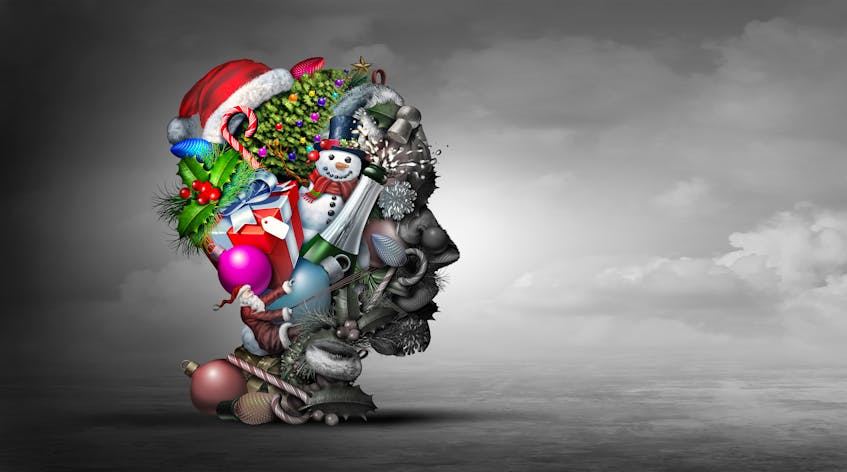With shorter, darker, and colder days, psychologists are worried about a mental health crisis among East Coast residents this winter as the COVID-19 cases rise and health precautions tighten.
Jessica Strong, an assistant professor of psychology at the University of Prince Edward Island, said the pandemic weighs heavily on people's minds, especially with restrictions over Christmas when traditionally families come together and celebrate.
"People are isolated or, at the very least, separated from their families. There is anxiety about the state of the world, possible financial stress due to unemployment or changes in employment, some (frontline and essential workers) may be facing symptoms of trauma or grief," said Strong.
"There were warnings related to the 'shadow pandemic' of mental health issues and the COVID-19 pandemic. We have already started to see evidence of this, and I would not be surprised if it continues to worsen in the coming months. Some groups are more vulnerable than others, but this is impacting everyone."
Christmas depression magnified

Christmas is supposed to be a joyous season, but it will be anything but for some this year when it comes to the pressures of gift-buying that can cause financial and emotional stress while managing crowds, traffic, or large stores.
"Depression generally presents with either low mood or anhedonia (loss of pleasure in things that are usually enjoyable for someone). Either of these feelings can be a warning sign, but to be diagnosed, it is the length of time someone feels these things that matters," explained Strong.
"We all experience hours or days where we might feel down or feel like staying home rather than doing something we enjoy, like reading a book or going for a walk. For someone to be diagnosed with depression, they will feel this way for a minimum of two weeks, every day, more of the day than not."
Other signs of depression could include loss of appetite, overeating, sleeping for hours, or less than usual.
"Some people also experience feelings of worthlessness or guilt, so the symptoms fall into a couple of categories that can include 'feelings or thoughts,' and 'body responses," she said.
These symptoms are presented differently across the lifespan, from children to seniors.
"Older adults tend to experience more physical symptoms and less of the sadness or emotional symptoms than younger or middle-aged adults," she said.
Then there's Seasonal Affective Disorder (SAD), which Strong says is a subtype of depression where someone has these symptoms in a seasonal pattern in the fall or winter, but the symptoms are better in the spring and summer.
"SAD and depression are not separate, but depression is the umbrella term that could include SAD, among others," said Strong.
Anxiety quadrupled: survey
In August, a national survey conducted by professor of psychology and psychiatry Dr. David Dozois found that out of 1,803 Canadian participants, anxiety had quadrupled from five to 20 per cent. Among those participants, 'high self-reported depression' had doubled since the onset of COVID-19.
From the individuals surveyed, depression would worsen with the continued restrictions of social isolation and physical distancing.

Greg Purvis and Tammy Kontuk, clinical psychologists at RiverStone Psychology and Counselling in New Glasgow, N.S., say it is reasonable to assume, given the above prediction, that the pandemic will continue to increase incidents of depression during the holiday season.
The two clinical psychologists have a YouTube channel on mental health-related issues called ‘Jerk Brain’. They say there are a few additional symptoms to look out for.
"Feelings of hopelessness, loss of energy, worthlessness, trouble concentrating, thoughts of death or suicide, and these symptoms are interfering with the ability to do important daily activities," said Purvis and Kontuk.
"Seasonal Affective Disorder (SAD) is now listed as a specifier of Major Depressive Disorder. Major Depressive Disorder with Seasonal Pattern is when a recurrent depression follows a seasonal pattern."

Coping strategies
Strong offered some coping strategies to help curb the dread of the holidays and the following months.
"First, it is essential to reach out for help. Some individuals find that talking to a counsellor, a minister, or a clinical psychologist can help. Seeing a psychiatrist for a medication that might work is another avenue. Many people do both," she said.
"A lot of studies suggest that the combined approach (medication and therapy) is the most effective way of putting depression into remission. Medications can start to work in four to six weeks."
She noted that simultaneously, the individual learns to recognize symptoms of depression, understand the cause, and address the current episode to prevent it from happening in the future.
"Some people also use light therapy to treat SAD, and studies support this as an effective treatment," Strong added.
Purvis and Kontuk said psychotherapy, antidepressant medication, and light exposure therapy can treat Major Depressive Disorder and Major Depressive Disorder with Seasonal Pattern.
"The new psychotherapy gold standard for treating depression is a behavioural therapy called behavioral activation therapy," they explain.
This type of therapy focuses on getting individuals to reactivate the day-to-day activities that disappeared as they became depressed.
"Particular attention goes to three significant antidepressant activities: social connection, activities that give you a sense of accomplishment and, things you do just for fun."
Purvis and Kontuk noted that light exposure therapy for SAD involves a very bright light (10,000 lumens) and 20 to 30 minutes of exposure with there is less direct sunlight. Psychotherapy and antidepressant medication can add to the treatment.
"Typically, light therapy is done first thing in the morning. These lights are becoming more popular (found at major retailers such as Costco and Amazon). Still, it is best to consult with a mental health professional before using one."
Purvis and Kontuk added to the list "exercise" to help curb depression.
"In particular, a brisk walk for 30 minutes three times a week, is as effective as many antidepressant medications and with no side effects."
Family and friends are encouraged to determine if they notice a loved one is more withdrawn or responsive.
"Individuals who are depressed may also make more self-critical comments than prior, that a friend or family could notice. It is important for someone experiencing depression to have an informal support network through their friends, family, or work. As well as getting professional help to decrease the length of time depression lasts, and again, preventing future episodes," said Strong.
If left completely untreated, a depressive episode can last six months, on average, she says.
"Depression is a tough mental health diagnosis, not only for the person who has it but for their friends and family as well. It can be draining for everyone involved. But depression is hugely prevalent, so anyone who is feeling this way should know that they are not alone."
Did you know?
Friends and family are critical allies in an individuals' battle against depression, said Purvis and Kontuk.
Here is how to recognize symptoms and help:
- Become aware of and look for the signs of depression
- If you notice signs of depression, encourage people to seek treatment
- Stay connected, even if they are reluctant to connect back, remember social connection is one of the three vital antidepressant activities and isolating oneself is common when depressed
- Encourage activity and exercise, for example, by inviting them for walks
- Keep an eye out for rumination (a particular type of repetitive thinking or talking that focuses on how bad things are). When appropriate, suggest a positive distracting activity. There is a delicate balance between being empathic and becoming a co-ruminator.









